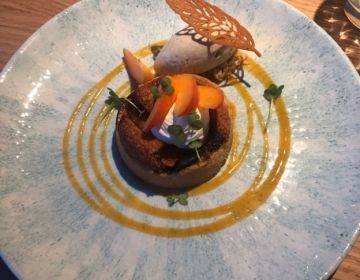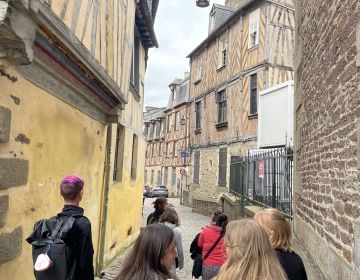The French Language
The blissfully ignorant (by “the ignorant”, I am of course referring to all who took Spanish in high school) often describe French as the language one learns when one wants to punish oneself. French is the mother of double-entendre, cough-inducing, incoherent choking sounds mixed with a healthy amount of cooking metaphors. While I cannot say that definition is entirely incorrect, I would like to politely point out that the beauty of this thousand-year-old language is worth the effort necessary to learn it.
First, English shares 60% of its proverbial DNA with French. This shared DNA is a result of a rather long and rocky history between England and France when neither of them were official countries yet. Words such as magnificent, carriage, attention and all other words ending in -tion were absorbed into the English language long ago simply because anglophones found the words beautiful.
However, it is not the similarities with English that prove that French is beautiful, but, as with any language, it is the differences. Wouldn’t the world be a boring place if every language were the same? The same grammar, the same pronunciation, the same expressions for the same situations. For English speakers, learning French is like reading a pop-up book about uncarbonated beverages. French stretches the brain that has been hard-wired to think in English and challenges our understanding of the way a language “should” be. It has rules of its own that are completely unique, especially in terms of pronunciation. After sitting down with the language, talking about your feelings, becoming friends, and maybe going on a couple roads trips over the course of multiple years, French doesn’t seem so unreasonable. In fact, it seems obvious. Of course -eaux is pronounced the way it is. Why? Because it’s French!
Once we reach a certain level in our understanding of the structure of French and obtain an ample lexicon, the final challenge is to sound French. The puckering of lips and clearing of throats are in full force to get the accent just right. If you observe closely, you will notice that the French barely move their mouths when speaking. Almost all vowels happen at the lips or in the throat. All of which is the complete opposite to English’s wide, open vowels and large mouth movements.
Speaking French is like being in a secret club. Once you arrive in France, you realize that the language and the culture and the music weren’t just figments of your imagination. There is nothing more satisfying than unleashing 5…6…7 years of bottled-up French that has been stored in your brain with no place to use it but the classroom. The true beauty of any language is the nuance in each expression and the filler words that make speech sound natural. The beauty of French is feeling like an Olympic champion when you can finally pronounce écureuil without sounding like you’re choking on an écureuil. Because anything that is truly beautiful is worth a little bit of extra effort.
Nicole Constant
Iowa State University
Summer Intensive French Language - IFL 2023
Related Posts
Traveling in France: A Visit to Plounerin and the Côte de Granit Rose
When I first arrived in Rennes, I didn’t necessarily have any specific plans to travel within the country. I’d assumed that something would eventually come up, and I’d get the... keep reading
The french way of thinking, being and interacting
Coucou! I’m Tomi, a rising sophomore at the Claremont Colleges in Los Angeles, California. I’m originally from Seattle, Washington, like many of the other students at my school. We all... keep reading
My First Impressions of Rennes and France
Arriving in France and knowing that you will not have to leave for over a month is one of the best feelings in the world. I arrived in Paris and... keep reading



